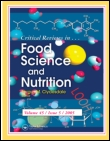
CRITICAL REVIEWS IN FOOD SCIENCE AND NUTRITION
Scope & Guideline
Exploring Critical Insights for a Healthier Future
Introduction
Aims and Scopes
- Food Safety and Quality Assurance:
The journal emphasizes the importance of food safety and quality, addressing topics such as pathogen detection, contamination prevention methods, and the application of novel technologies in ensuring food safety. - Functional Foods and Nutraceuticals:
A significant focus is placed on functional foods and nutraceuticals, exploring their health benefits, mechanisms of action, and potential applications in disease prevention and management. - Dietary Patterns and Health Outcomes:
The journal explores the impact of various dietary patterns on health outcomes, investigating the relationships between nutrition, chronic diseases, and overall health. - Food Processing and Technology Innovations:
Advancements in food processing technologies are a core area, with discussions on novel methods, their implications for food quality, safety, and nutritional value. - Bioactive Compounds and Their Mechanisms:
The exploration of bioactive compounds derived from food sources, their health effects, and the mechanisms through which they exert their benefits is a recurring theme. - Sustainability and Environmental Impact:
The journal also addresses sustainability in food production and consumption, emphasizing eco-friendly practices and the impact of food systems on the environment. - Microbiome and Nutritional Interactions:
There is an increasing emphasis on the relationship between the gut microbiome and nutrition, exploring how dietary components can influence microbiota composition and function.
Trending and Emerging
- Plant-Based Diets and Alternatives:
Research on plant-based diets, including the health benefits of plant proteins, legumes, and alternative protein sources, has surged, reflecting a global shift towards vegetarian and vegan diets. - Microbiome Research:
The exploration of the gut microbiome's role in health and disease, including its interaction with dietary components, is increasingly prominent, highlighting the importance of microbiota in nutritional science. - Food Technology and Innovation:
Emerging technologies such as nanotechnology, biotechnology, and advanced processing methods are trending topics, focusing on their applications in improving food safety, quality, and health benefits. - Nutritional Genomics and Personalized Nutrition:
There is a growing interest in the field of nutritional genomics, investigating the interplay between diet, genetics, and health, paving the way for personalized dietary recommendations. - Functional and Bioactive Ingredients:
The study of functional and bioactive ingredients from food sources, their health benefits, and their potential applications in functional foods is gaining traction. - Sustainability in Food Systems:
Research addressing sustainability challenges in food production and consumption, including waste reduction, eco-friendly practices, and the environmental impact of dietary choices, is increasingly relevant.
Declining or Waning
- Traditional Food Preservation Techniques:
Interest in conventional food preservation methods, such as pickling and canning, appears to be waning as newer, more innovative preservation techniques gain popularity. - Basic Nutritional Studies:
There is a noticeable decline in basic nutritional studies focusing solely on macronutrient intake without considering the broader context of dietary patterns and health outcomes. - Animal-Based Protein Sources:
Research focusing exclusively on animal-based protein sources is decreasing as the trend shifts toward plant-based proteins and alternative protein sources for sustainability and health reasons. - Single Nutrient Focus:
There is a decline in studies that isolate single nutrients for analysis, as the trend moves towards a more holistic approach to nutrition that considers food matrices and dietary patterns.
Similar Journals

eFood
Transforming food systems with open-access knowledge.eFood is a pioneering journal in the field of food science, published by the esteemed WILEY. With its impactful emergence, the journal has rapidly established itself within the academic community, evidenced by its impressive Q1 category ranking in Food Science as of 2023, and a commendable position at Rank #95 out of 389 in the Scopus database. Covering a wide spectrum of topics related to food innovation, technology, safety, and nutrition, eFood serves as an indispensable platform for researchers, industry professionals, and students who are at the forefront of advancing our understanding of food systems. The journal notably operates with an open-access model, promoting wide dissemination of knowledge while enhancing the visibility of high-quality research. As we look forward to converging years from 2020 to 2024, eFood is poised to foster rigorous scientific discourse and contribute significantly to the future of food science research.

Ukrainian Food Journal
Elevating nutrition knowledge for a healthier future.Ukrainian Food Journal is an esteemed open-access journal dedicated to advancing the field of food science and biochemistry. Established in 2012 and published by the National University of Food Technologies in Ukraine, the journal serves as a vital platform for researchers and professionals to disseminate their findings on food technology, safety, and nutritional biochemistry. With an ISSN of 2304-974X and E-ISSN 2313-5891, it offers a wealth of knowledge to its readers, promoting innovation and collaboration within the industry. While currently categorized within the Q4 quartile of biochemistry and the Q3 quartile of food science, the journal is progressively gaining recognition, reflecting a commitment to quality research in a competitive field. The journal is indexed in Scopus, ranking #271 in Food Science and #376 in Biochemistry, underscoring its relevance and contribution to agricultural and biological sciences. The Ukrainian Food Journal not only enriches the academic community with its open-access model but also aims to foster dialogue among researchers, professionals, and students dedicated to improving food systems and nutrition. It operates from its headquarters in Kyiv, offering a hub for creativity and advancement in food-related research.
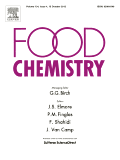
Food Chemistry
Innovating Food Analysis for a Healthier FutureFood Chemistry, published by Elsevier Science Ltd, is a leading international journal dedicated to the publication of high-quality research in the field of food chemistry. Established in 1976, this journal has made a significant impact in its realm, with an impressive 2023 impact factor and ranked Q1 in Analytical Chemistry, Food Science, and miscellaneous Medicine categories. It currently holds a remarkable Scopus ranking of #3 in Analytical Chemistry and #11 in Food Science, signifying its relevance and prestige among the top scholarly publications. With a wide scope that includes the chemistry of food composition, flavor, and safety, Food Chemistry serves as an essential resource for researchers, professionals, and students alike, offering insights and advancements in food analysis and technology. Access options may vary, and the journal is committed to disseminating innovative findings to foster knowledge and application in the dynamic field of food science.
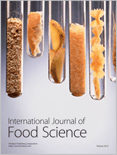
International Journal of Food Science
Delivering Cutting-edge Insights in Food ScienceThe International Journal of Food Science, published by HINDAWI LTD, stands as a crucial platform for advancing knowledge within the realm of food science. Established in 2013, this Open Access journal based in Egypt has garnered significant recognition, achieving an impressive Q2 classification in the 2023 Food Science category, which reflects its commitment to quality and impactful research. With a Scopus rank of #88 out of 389 in Agricultural and Biological Sciences and placing in the 77th percentile, this journal serves as an essential resource for researchers, professionals, and students dedicated to innovative developments and scientific exploration in food science. The journal not only provides unrestricted access to valuable research but also aims to foster collaboration and dissemination of knowledge on critical issues affecting food safety, nutrition, and technology. For those looking to keep abreast of the latest advancements, the International Journal of Food Science is certainly an indispensable addition to their academic pursuits.

Foods
Pioneering Sustainable Solutions in Food Research.Foods is a premier open access journal published by MDPI, based in Switzerland, that has been at the forefront of disseminating high-quality research in the fields of food science, health professions, and plant science since its establishment in 2012. With an impressive convergence of interdisciplinary studies spanning various aspects of food, nutrition, and microbiology, the journal aims to provide a comprehensive platform for researchers and professionals to share innovative ideas and findings. Maintained as a Q1 journal in multiple categories for 2023, including Food Science and Health Professions, Foods has garnered significant recognition within the academic community, reflected in its strong Scopus rankings and percentiles across various disciplines. The journal not only promotes open access to enhance the visibility and accessibility of research but also encourages the exploration of sustainable food systems and health-related issues, thus contributing to essential discussions in today's society. For those looking to advance their understanding and expertise in food-related sciences, Foods serves as an enduring resource for groundbreaking studies and critical insights.
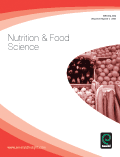
Nutrition & Food Science
Advancing nutritional knowledge for a healthier tomorrow.Nutrition & Food Science, published by EMERALD GROUP PUBLISHING LTD, is a prominent journal dedicated to advancing the understanding of nutritional science and food technology. With an ISSN of 0034-6659 and an E-ISSN of 1758-6917, this journal has provided a platform for scholarly articles, reviews, and insightful research since its inception in 1971. The journal is recognized in the Q3 quartile for both Food Science and Nutrition and Dietetics categories, showcasing its moderate impact within the field. Currently ranked #202 in Food Science and #81 in Nutrition and Dietetics based on Scopus metrics, it caters to a diverse audience of researchers, practitioners, and students eager to explore the latest findings and developments. While not an open-access journal, it offers various subscription options for individuals and institutions keen on accessing high-quality research. With a commitment to interdisciplinary collaboration and practical applications, Nutrition & Food Science is an essential resource for those invested in improving health outcomes through informed dietary practices and food innovations.

CZECH JOURNAL OF FOOD SCIENCES
Transforming Food Systems Through Rigorous ResearchCzech Journal of Food Sciences is a premier publication in the field of food science, disseminating vital research since its inception in 1999 and transitioning to Open Access in 2007. Published by the Czech Academy Agricultural Sciences, this journal facilitates the exchange of knowledge among researchers, professionals, and students dedicated to advancing the understanding of food systems, safety, and technology. With an ISSN of 1212-1800 and an E-ISSN of 1805-9317, it holds a respectable position with a Q3 ranking in the Food Science category for 2023, illustrating its commitment to high-quality research despite its Scopus rank of 209 out of 389, situated in the 46th percentile. Located in the heart of the Czech Republic, at TESNOV 17, PRAGUE 117 05, this journal serves as an essential resource for those involved in agricultural and biological sciences, paving the way for innovative discoveries and applications in food science.
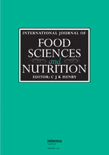
INTERNATIONAL JOURNAL OF FOOD SCIENCES AND NUTRITION
Championing excellence in food research since 1947.International Journal of Food Sciences and Nutrition, published by Taylor & Francis Ltd, is a premier, peer-reviewed journal that has established itself as a leading platform for the dissemination of cutting-edge research in the field of food science and nutrition. With an impressive Q1 categorization and an academic rank of #59/389 in Scopus’s Agricultural and Biological Sciences category, this journal is recognized for its significant impact, facilitating critical discussions and advancements related to food quality, safety, and nutritional health. Its historical significance, covering research from as early as 1947 to the present day, underscores the journal's long-standing commitment to scientific rigor and innovation. Researchers and professionals benefit from this journal's comprehensive and diverse range of studies, contributing to informed practices and developments in the food industry and public health. Although the journal is not open access, it provides various access options, ensuring that high-quality research is available to academics and practitioners alike. Stay connected with current trends and breakthroughs in food sciences and nutrition through this highly respected publication.

International Food Research Journal
Fostering Excellence in Global Food ResearchThe International Food Research Journal, published by UNIV PUTRA MALAYSIA PRESS, serves as a pivotal platform for disseminating innovative research within the field of food science. With an ISSN of 1985-4668 and an E-ISSN of 2231-7546, the journal has successfully established its presence since its inception in 2007, converging its findings through 2024. This esteemed journal holds a Q3 ranking in Food Science, illustrating its valuable contributions to the field as demonstrated by its Scopus rank of 276 out of 389, placing it in the 29th percentile among its peers in Agricultural and Biological Sciences. Although it operates under a traditional publishing model, its academic integrity and focus on high-quality research ensure that it remains a vital resource for researchers, professionals, and students eager to explore advances in food technology, nutrition, and safety. By encouraging interdisciplinary collaboration and critical dialogue, the International Food Research Journal plays an essential role in shaping the future of food science research.
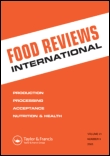
FOOD REVIEWS INTERNATIONAL
Bridging Academia and Industry in Food ScienceFOOD REVIEWS INTERNATIONAL, published by Taylor & Francis Inc, serves as a pivotal resource within the fields of Food Science and Chemical Engineering. Established in 1985, this esteemed journal offers a comprehensive platform for the dissemination of critical reviews that enhance understanding and innovation in the food industry. With an impressive impact factor reflecting its Q1 quartiles in both Food Science and Chemical Engineering categories, it ranks among the top journals in Scopus, securing the 24th spot in Agricultural and Biological Sciences. Scholars, researchers, and professionals are encouraged to explore its rich content, which spans meticulously reviewed articles that bridge academic research and practical applications, while contributing to advancements in food safety, processing, and sustainability. Although not an Open Access journal, access to its extensive repository is vital for anyone aiming to stay at the forefront of food science advancements.